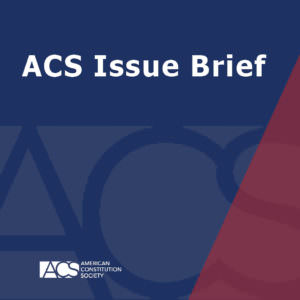Why Does Business (Usually) Win in the Roberts Court?
Associate Professor of Law, DePaul University College of Law
 February 17, 2011
February 17, 2011
ACS is pleased to distribute “Why Does Business (Usually) Win in the Roberts Court?,” an Issue Brief by David L. Franklin, Associate Professor of Law at DePaul University College of Law. In this Issue Brief, Professor Franklin looks at the success rate of the U.S. Chamber of Commerce in the Roberts Court and concludes that, while there is little doubt that the Court is "business-friendly," its decisions in business cases are characterized not so much by a bias in favor of business per se, but by a skepticism about litigation as a mode of regulation. Thus, businesses fare especially well when they are defendants; even better when the justices appear to view the litigation in question as having broad regulatory goals as opposed to individualized remedial objectives; and better still when the justices view the litigation as lawyer-driven rather than party-driven.
Read the full Issue Brief here: Why Does Business (Usually) Win in the Roberts Court?
